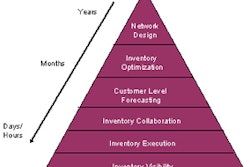Shanghai, China — December 18, 2006 — Rapid growth in the Chinese automotive sector has created the need for an effective and efficient logistics infrastructure to take advantage of growing domestic as well as export opportunities, while intensifying competition as companies look to increase market penetration and optimize the supply chain presents a substantial market opportunity to third-party logistics (3PL) service providers, according to a new report from consulting company Frost & Sullivan.
"An increasing number of automotive companies prefer to focus on core competencies and outsource non-core activities such as logistics to specialized 3PL service providers, to benefit from cost savings and enhanced efficiency," said Frost & Sullivan Research Associate Keow Soon Hiong. "At the same time, the Chinese government's focus on improving the country's logistics infrastructure has been instrumental in encouraging significant investment from multinational 3PL service providers."
The new report from Frost & Sullivan, "Strategic Analysis of 3PL Markets in the Chinese Automotive Sector," finds that these markets earned revenues of $10.45 billion in 2005, with revenues likely to reach $59.91 billion by 2012.
Key Challenges for 3PLs
Adoption rates of these services are already high among multinational automotive companies due to higher acceptance levels. This is compelling domestic major automotive companies to follow suit in order to retain a competitive advantage. Accordingly, 3PL service providers are gearing up to meet the expected rise in demand by expanding their offerings and providing complete services at relatively affordable prices.
However, providers are expected to face a considerable challenge in dealing with the varying levels of logistics infrastructure and development across China. Additionally, significant differences between various regions in terms of consumer habits as well as business, tax, and administrative rules tend to shape the logistics needs of the automotive sector on a regional basis. This could hamper providers' efforts to offer a complete nationwide logistics solution.
For instance, the automotive sector is better developed in some parts of the East and South compared to others in the Central and Western regions. Thus, the key challenge for 3PL service providers is to accurately assess the specific needs of a particular region and offer services accordingly, Frost & Sullivan said.
WTO Impact
"Since the Chinese automotive sector is continuously developing, it is important for service providers to grow in tandem with automotive companies so as to emerge successful," Soon Hiong said. "Service providers also need to assess the geographic needs and expansion plans of end-users and offer appropriate services, including advanced concepts such as just-in-time (JIT) logistics."
A significant development that is likely to positively impact the logistics industry is the elimination of restrictions on operating in the industry following China's accession to the World Trade Organization (WTO) in 2001. Foreign enterprises can now operate as wholly owned subsidiaries in services such as transport, warehousing, freight forwarding and others.
The stage is therefore set for substantial growth of 3PL services and the opportunities for service providers are plentiful. However, to fully exploit the potential of this promising market, service providers need to find ways to meet the challenge presented by China's geographical diversity as well as familiarize themselves with local jurisdictions, so that they are able to incorporate a higher degree of uniformity in their service offerings.
"Strategic Analysis of 3PL Markets in the Chinese Automotive Sector" provides an overview of this market, including an analysis of the various segments of the automotive sector and their respective logistical needs. It also provides an analysis of key drivers, restraints and trends that are impacting the 3PL markets in the automotive sector.
"An increasing number of automotive companies prefer to focus on core competencies and outsource non-core activities such as logistics to specialized 3PL service providers, to benefit from cost savings and enhanced efficiency," said Frost & Sullivan Research Associate Keow Soon Hiong. "At the same time, the Chinese government's focus on improving the country's logistics infrastructure has been instrumental in encouraging significant investment from multinational 3PL service providers."
The new report from Frost & Sullivan, "Strategic Analysis of 3PL Markets in the Chinese Automotive Sector," finds that these markets earned revenues of $10.45 billion in 2005, with revenues likely to reach $59.91 billion by 2012.
Key Challenges for 3PLs
Adoption rates of these services are already high among multinational automotive companies due to higher acceptance levels. This is compelling domestic major automotive companies to follow suit in order to retain a competitive advantage. Accordingly, 3PL service providers are gearing up to meet the expected rise in demand by expanding their offerings and providing complete services at relatively affordable prices.
However, providers are expected to face a considerable challenge in dealing with the varying levels of logistics infrastructure and development across China. Additionally, significant differences between various regions in terms of consumer habits as well as business, tax, and administrative rules tend to shape the logistics needs of the automotive sector on a regional basis. This could hamper providers' efforts to offer a complete nationwide logistics solution.
For instance, the automotive sector is better developed in some parts of the East and South compared to others in the Central and Western regions. Thus, the key challenge for 3PL service providers is to accurately assess the specific needs of a particular region and offer services accordingly, Frost & Sullivan said.
WTO Impact
"Since the Chinese automotive sector is continuously developing, it is important for service providers to grow in tandem with automotive companies so as to emerge successful," Soon Hiong said. "Service providers also need to assess the geographic needs and expansion plans of end-users and offer appropriate services, including advanced concepts such as just-in-time (JIT) logistics."
A significant development that is likely to positively impact the logistics industry is the elimination of restrictions on operating in the industry following China's accession to the World Trade Organization (WTO) in 2001. Foreign enterprises can now operate as wholly owned subsidiaries in services such as transport, warehousing, freight forwarding and others.
The stage is therefore set for substantial growth of 3PL services and the opportunities for service providers are plentiful. However, to fully exploit the potential of this promising market, service providers need to find ways to meet the challenge presented by China's geographical diversity as well as familiarize themselves with local jurisdictions, so that they are able to incorporate a higher degree of uniformity in their service offerings.
"Strategic Analysis of 3PL Markets in the Chinese Automotive Sector" provides an overview of this market, including an analysis of the various segments of the automotive sector and their respective logistical needs. It also provides an analysis of key drivers, restraints and trends that are impacting the 3PL markets in the automotive sector.












